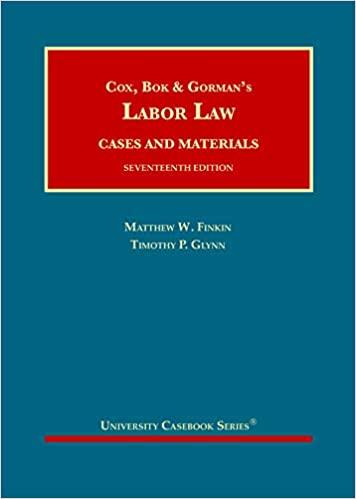Question
While the Civil Rights Act of 1964, as amended by the Equal Employment Act in 1972 and enforced by the Equal Employment Opportunity Commission (EEOC),
While the Civil Rights Act of 1964, as amended by the Equal Employment Act in 1972 and enforced by the Equal Employment Opportunity Commission (EEOC), prohibits discrimination on the basis of race, color, religion, sex, national origin, Title VII of the Act, as amended, prohibits sexual harassment in the workplace. The Americans with Disabilities Act (ADA) is different in that employers cannot discriminate in hiring, promotion, and selection criteria against a "qualified individual with a disability." Qualified means that the individual, with "reasonable accommodation," can perform all "essential functions" of the job. Reasonable accommodation by an employer could include restructuring the job, allowing part-time or modified work schedules, reassigning disabled individuals to vacant positions, and acquiring or modifying equipment, among other things. The leading case of accommodation for a disabled person is PGA Tour, Inc. v. Martin, 531 U.S. 1049 (2001) (briefly described in Jennings, 2016, p. 477), where the Supreme Court allowed Martin to use a cart in PGA tournaments because of his circulatory ailment.
For this discussion, read the majority opinion in full (see Finding a Legal Case), as well as the dissent by Justice Scalia; summarize the rationale for the decision and then opine as to whether you agree with the outcome of the case or not - and why. What might be the implications of this case in the future?
Finding a Legal Case:
Lexis-Nexis is available for all students through the library to find cases (among other things):
- Start at the Library's Databases page. Use your CCU login information and password (same as that used to sign into Blackboard).
- Scroll down and click on the LexisNexis Academic link.
- Select "Look up a Legal Case" from the LexisNexis Academic page.
- Enter your search information; you will have three choices - by citation, parties, or topic. For example (using the example from the introductory paragraph), you can enter the parties' names (PGA Tour, Inc. v. Martin) or you can enter the citation (531 U.S. 1049), and either one should take you to that case.
- Review the "Headnotes" at the beginning of the case for a summary of issues and holdings, but be sure to also scroll down and read the actual opinion by the judge and the dissent by Justice Scalia (near the end of the case).
Step by Step Solution
There are 3 Steps involved in it
Step: 1

Get Instant Access to Expert-Tailored Solutions
See step-by-step solutions with expert insights and AI powered tools for academic success
Step: 2

Step: 3

Ace Your Homework with AI
Get the answers you need in no time with our AI-driven, step-by-step assistance
Get Started


